CUC eNews: February 22, 2023 – Issue 147
In This Issue:
- Letter from Vyda Ng
- Save the Dates
- A Call for Love and Compassion
- The UUA is Doing What to our Principles?
- Meet a Minister: Rev. Fiona Heath
- CUC Decision-making Process Review
- Covenanting Through Transitions
- Project Ploughshares: An Interview with Colin Read
- Continuing the Work of Inclusivity and Our Whole Lives
- Apply for the Sharing our Faith and Theological Education Funds
- 2023 Intergenerational Spring Seminar
- Empowerment with the Goddesses: Celebrating International Women’s Day
- Unicamp Dog Survey
- The CUC is Hiring!
- Call for Nominations: CUC Board of Trustees and Nominating Committee
- What’s Making Us Smile
- Calendar of Events
Letter from Vyda Ng
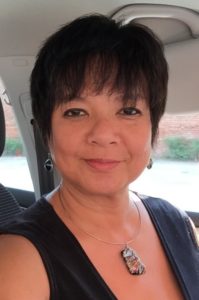
What is your ministry? In an article in UU World (Spring 2020), Liz James writes that, as Unitarian Universalists, we think of ministry as “important work you’re called to do . . ..[and] we believe everyone is called to do important work.” While we are fortunate to have many incredible, dedicated professional ministers in our UU community, we all have a role to play in building beloved community.
For over 20 years, I have been passionate about building and supporting the Canadian Unitarian Universalist (UU) community. I joined the Canadian Unitarian Council’s (CUC’s) Nominating Committee briefly in 2002, and then was nominated to the Board of Trustees in 2003. Prior to this, I was heavily involved in the Avalon Unitarian Fellowship in St. John’s, NL, which has sadly dissolved. After my term on the Canadian Unitarian Council Board, I continued to volunteer for the organization until 2012, when I became the Executive Director. Over the years, I have been privileged to share the community’s joys and sorrows. To hold the community gently. To worship and learn with you as we envision a world of love and justice. To be with you through the challenges and difficult times. It is not the work of a professional, ordained minister, but it is important work. Through conversation with ministers and mentors, I have come to see it as my ministry.
February is CUC Month. In this issue of the eNews, we are highlighting some of the important work Canadian UUs are doing to care for our planet and each other. From Colin Read’s longtime involvement with Project Ploughshares to the role of Our Whole Lives (OWL) facilitators in transforming lives through lifespan sexuality education. From the critical work of the Canadian Unitarian Council’s (CUC’s) decision-making exploration team to the professional ministry of Rev. Fiona Heath.
What is your ministry? Are you a religious educator? A musician? An activist? A lay chaplain? A committee member? An emerging leader? We’d like to hear from you. Email us at communications@cuc.ca.
Be well,
Vyda Ng
Save the Dates
AGM Motions Conversation, Saturday, February 25
In-person at First Unitarian Congregation of Ottawa and online via Zoom
11:30 am PT | 12:30 pm MT | 1:30 pm CT | 2:30 pm ET | 3:30 pm AT | 4:00 pm NT (1 hour)
Join members of the First Unitarian Congregation of Ottawa and CUC Executive Director Vyda Ng in a conversation about the proposed motions for the AGM. For leaders, delegates, and those who missed the January roundtable conversation. Find the motions information here in the AGM 2023 folder.
Leaders’ Roundtable: Annual General Meeting (AGM) Plenary Discussion Saturday, April 29
9:00 a.m. PT | 10:00 a.m. MT | 11 :00 a.m. CT | 12:00 p.m. ET | 1:00 p.m. AT | 1:30pm NT (1.5 hours)
In advance of the Annual General Meeting on May 19th, 2023, the Canadian Unitarian Council (CUC) Board and Executive Director invite you, especially leaders and delegates, to a conversation about the proposed motions.
At this point, there won’t be any substantive changes made to the motions, and this conversation aims to inform and engage participants at the AGM, both delegates and observers alike.
Register for the roundtable today.
Find the motions information here in the AGM 2023 folder.
CUC Annual General Meeting (AGM) 2023
Friday May 19: In Person and Online via Zoom
10:00 am PT | 11:00 am MT | 12:00 CT | 1:00 pm ET | 2:00 pm AT | 2:30 pm NT (3.5hrs)
The Canadian Unitarian Council’s Annual General Meeting (AGM) takes place on Friday, May 19th. It’s a time to attend to the business of the Council and a chance for congregations and their delegates and members to be involved in making decisions that affect our national faith community.
The AGM is open to all and free of charge, and observers may attend in-person or online. The AGM will be held on the campus of Algonquin College in Ottawa; Zoom will be used for virtual participants.
Congregations should select their delegates early (here are some points to consider), and since this is a multi-platform AGM, your congregation may select both virtual and in-person delegates.
All delegates must be registered by May 1, 2023 in order for your congregation to vote.
2023 National Symposium on Living into the 8th Principle
May 19 to 21, 2023: Online or In person in Ottawa, Ontario
Join the Canadian Unitarian Universalist (CUC) community for a rich, transformative weekend. Engage in meaningful discussions, multigenerational activities, social events, and worship services at the 2023 National Symposium on Living into the 8th Principle.
Bring the family with you! We are pleased to offer a children’s program and youth conference (CanUUdle). These programs are only available in-person.
Registration
We will launch the 2023 Symposium website and registration system soon. Watch for an announcement in the coming weeks.
This year, you will be able to register to attend the symposium online or–for the first time since 2018–in person. What’s the difference between the two options?
In-person Participation
In-person adult and young adult registration gives you access to all symposium events and programming. Explore all the sessions we offer including the opening ceremony, the Confluence Lecture featuring Rev. Julie Stoneberg, streams, multigenerational Sunday, networking and social opportunities, including Chalice Circles. Sunday worship will be led by Rev. Eric Meter with Revs. Diane Rollert and Fulgence Ndagijimana.
The Canadian Unitarian Council (CUC) requires all participants,volunteers, and event presenters to be fully vaccinated (at least two vaccinations) against Covid-19, and to wear masks, at our in-person events (except for meals). For more information, please review our Health and Safety web page.
Virtual Participation
Those who choose not to travel to Ottawa can participate in most events virtually. The opening ceremony, Confluence Lecture, keynote lecture, streams, and Sunday worship will be multiplatform. You can access them via Zoom if you’ve registered to attend the symposium. Virtual participants will be placed into virtual Chalice Circles. However, they will not be able to participate in the multigenerational activities on Sunday afternoon or networking and social events throughout the weekend.
Free Livestream Events Available to All
Two events will be livestreamed on the CUC’s YouTube channel:
-
-
- Friday, Opening Ceremony and Confluence Lecture starting at 6:30 pm ET
- Sunday’s National Service at 10:30 am ET
-
Join us on YouTube for these events!
Post-Symposium: OWL Facilitator Training – In-person
Become a facilitator for Our Whole Lives (OWL) sexuality education. We will be offering theoretical and hands-on training to lead the Our Whole Lives programs for children, youth, or adults from May 21 to 23, 2023. The cost to register for the training is $300 (for those attending the symposium) or $350 (for those attending OWL training only.) Registration coming soon on the CUC Events page.
Meals and Accommodations
The Canadian Unitarian Council (CUC) and Host Committee have made arrangements with Algonquin College to accommodate out-of-town attendees; you may also stay with local Unitarian Universalists (UUs) through a limited number of home hospitality offerings. The cost to stay on campus is $70.63 (including tax) per room per night. You can book your accommodations when you register for the symposium and/or OWL training.
At the same time, you can order your meals. Vegan, vegetarian, gluten-free, and special request meals will be available. Prices vary.
Fees and Subsidies
We offer a sliding scale for payment options. The Canadian Unitarian Council’s website has guidelines to help you determine where you might land on the scale.
Young adults and adults are asked to pay between $75 and $450 if they plan to attend the symposium in person or between $25 to $200 if they will attend virtually.
The registration fee for CanUUdle, the youth con, includes all meals and accommodations. The suggested price range is from $50 to $145 per youth participant.
The cost for each child or junior youth (0 to 14) ranges from $10 to $100.
Please note: meals and accommodations are not included in the registration fee, except for those attending CanUUdle.
Money should not be a barrier to your participation in the symposium. You may apply for a subsidy if needed. Subsidies are available for all ages.
Adult subsidies are available to help with registration and travel costs for adults (19 years+) through the E.B. Ratcliffe Leadership Development Fund. Applications for assistance for the symposium must be received by March 22 (sooner is better) to give enough time for processing and booking travel. Visit the EB Ratcliffe subsidies page to read more and apply with the easy online application form.
Youth (14-19 years) and Young Adult Subsidies (18-35 years): Subsidies are available to help with registration and travel costs for youth, advisors, and young adults through the Dawning Future Youth and Young Adult Subsidy Fund. Applications for assistance for CanUUdle and the symposium must be received by March 22, 2023 (sooner is better) to give enough time for processing and booking travel. Visit the Dawning Future subsidies page to read more and complete the easy online application form.
If you’re booking flights, make sure to book flights you can change.
A Call for Love and Compassion
By the CUC’s National Voice Team

A.statement from the UU Ministers of Canada President, Rev. Anne Barker; CUC Board President, Chuck Shields, and Executive Director, Vyda Ng.
Our hearts are heavy as we bear witness to grief and suffering in our local communities and around the world. We feel the weight of the devastation caused by the recent tragedy in Laval, Quebec, the earthquakes in Turkey and Syria, revolution in Iran, and armed conflicts in Yemen, Ukraine, and Myanmar. The cumulative effects of the Covid-19 pandemic, and the violence against Indigenous, Black, and marginalized people, are both exhausting and overwhelming.
“It is understandable to feel saddened, outraged, or helpless as we read or watch the news,” says Anne Barker, President of the Unitarian Universalist Ministers of Canada. “As we strive towards a more peaceful, just, and equitable world, may we come together to heal strands of the great web as in this prayer by Rev. Erika Hewitt.
Healing Strands of the Great Web
Mystery of mysteries, we are thirsty for justice and bearing witness to grief.
We’re claiming our inherent wholeness, and healing strands of the Great Web.
We are hungry for liberation and cracking ourselves wide open.
We are mourning the dead and fighting for the living.
We’re singing for joy and striving for meaning.
We’re embodying love;
reaching out in love;
acting on Love’s behalf;
And letting that Love wash over us, ebbing and flowing, as it carries and holds us all.
May we do it all over again when the new day comes.
The following organizations are accepting donations to address the crisis in Turkey and Syria:
-
- Medecins sans Frontieres / Doctors without Borders
- Red Cross (The Government of Canada will match donations made to the Red Cross by February 22, 2023 up to $10 million.)
- CanadaHelps
- Coalition of charities joining together to help with earthquake
The UUA is Doing What to the Principles and Sources?
By Kiersten Moore, CUC Board representative for the BC region
 Changing them up completely, that’s what! The Unitarian Universalist Association (UUA), the United States’s national association of Unitarian Universalist congregations, is envisioning six core values, rather than Principles, centred around Love as “the enduring force that holds us together.” Pluralism, Interdependence, Equity, Generosity, Justice, and Evolution. Each value has a brief statement and an explicit Covenant of actions associated with it. They are in a circle rather than numbered or hierarchical. The sources are changed to a statement that “we draw upon, and are inspired by, the full depth and breadth of sacred understandings, as experienced by humanity. Grateful for the religious lineages we inherit and the pluralism which enriches our faith, we are called to ever deepen and expand our wisdom.”
Changing them up completely, that’s what! The Unitarian Universalist Association (UUA), the United States’s national association of Unitarian Universalist congregations, is envisioning six core values, rather than Principles, centred around Love as “the enduring force that holds us together.” Pluralism, Interdependence, Equity, Generosity, Justice, and Evolution. Each value has a brief statement and an explicit Covenant of actions associated with it. They are in a circle rather than numbered or hierarchical. The sources are changed to a statement that “we draw upon, and are inspired by, the full depth and breadth of sacred understandings, as experienced by humanity. Grateful for the religious lineages we inherit and the pluralism which enriches our faith, we are called to ever deepen and expand our wisdom.”
The Article II Study Commission of the UUA was charged in the fall of 2020 to review Article II: Principles and Purposes of the UUA Bylaws which is where our Canadian Principles and Sources come from. It is the foundation for all the work of the UUA and its member congregations and covenanted communities. The UUA includes 16 of Canada’s 43 CUC congregations who kept their UUA membership in 2002. The current Principles and Sources of the UUA were last revised in 1987 and the CUC adopted them by resolution in 2002 after consultation with our member congregations upon withdrawing from UUA membership.
Between 2003-2008, the Canadian Unitarian Council (CUC) undertook a review and study of the Principles. The final report was presented to congregations at the 2008 Annual General Meeting with several recommendations. The Principles and Sources remained largely unchanged. In November 2021, the CUC added an 8th Principle, along with 222 other UU congregations and associations across North America.
The UUA’s Article II Study Commission was formed in response to many discussions, proposals, and resolutions that have come from the UUA Board, from earlier UUA commissions, and grassroots groups periodically since 2009. The Commission has engaged active participation of (mainly American) UUs across all demographics, identities, and theological/philosophical beliefs. The Commission itself consists of people from a broad demographic, including two full voting youth members. They were encouraged to review all parts of article II and given freedom to revise, replace, or restructure them as needed to meet the objectives of their charge. As stated in the Charge to the Commission:”There is nothing sacred about the number of principles or sources, nor their specific wordings, nor in the way Article II is laid out. We encourage creativity. The Board would like to see an Article II that is inspirational, memorable and poetic.”
The CUC Board has undertaken the beginnings of a CUC bylaw review, some points of which will come to the AGM in May 2023. We are also waiting on recommendations from the Decision-Making Exploration Team, formed to explore alternative decision-making processes, which may impact our considerations around consensus-based decision making, Robert’s Rules, and how the CUC conducts business. As a part of that, we will also be exploring a process by which to amend, revise, or re-write our Principles and Sources that we migrated over from the UUA in 2002. We did not include them in our bylaws or in our statement of purposes. They live as adopted by simple resolution at an AGM and the current process by which to change them is the same resolution process we use for any other decision. Is it now time to review our Principles as a whole and rewrite them for a new age?
I encourage Canadians to be part of the conversation with the Article II Study Commission. If their proposal is voted in at the UUA’s 2023 June General Assembly and ratified the following year, it will inevitably have implications for us in Canada. All of our professional associations are continental – Ministers, Religious Educators, Music professionals, Administrators, Membership professionals. Credentialing of religious educators and fellowshipping of ministers is through the UUA. Our theological seminaries are in the U.S. Many resources are focused on the Principles. The CUC does not have the capacity to independently create substantial religious education resources, or to be involved with credentialing of professional leadership or ministerial transitions.
It is important that we have the CUC as a national body and voice and it is very true that Canada is an independent country, not a 51st state. However, Canadian Unitarians/Unitarian Universalists are not a fully independent national denomination and we never have been. Therefore, it would be meaningful to engage in the conversation. About one-third of Canadian Unitarian/Universalist congregations retained their membership in the UUA, 15 out of 43. Even if we do end up diverging further in how our principles and sources are stated, we should identify our commonalities and connective through line.
For more information about the proposal and the next steps in the process, watch this video of the Article II Study Commission Report to the UUA Board of Trustees.
Meet a Minister: Rev. Fiona Heath
By Kenzie Love
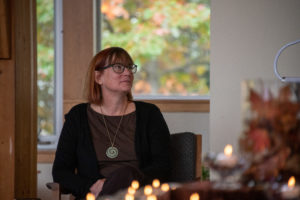
After almost nine years, Rev. Fiona Heath is concluding her ministry with the Unitarian Congregation in Mississauga (UCM) this coming April. Some changes in her life during the pandemic gave her an opportunity to reflect. She decided that she was ready to leave the Greater Toronto Area for a smaller community.
“I loved being the minister at Unitarian Congregation in Mississauga,” she says. “They’re a good group of people, and the decision for me was more personal than professional.”
Looking back at her time with UCM, Fiona believes the congregation has fulfilled its vision.
“They came asking me to work with them to re-engage their systems, and to deepen in spirit. To shift the congregation into greater engagement with Unitarian Universalism,” she says. “And I’d say we’ve done that.”
During Fiona’s time at UCM, the congregation created a new mission statement. It also sponsored many refugees over the years. It became a Green Sanctuary. And was the first UU congregation in Canada to adopt the Eighth Principle. Fiona also believes congregants have become more intentional about how to live into their faith in small, everyday ways.
Fiona acknowledges the congregation has faced challenges as well. Such as the lockdowns it endured in the early stages of the pandemic. And while she’s proud of its adoption of the eighth principle, she notes this is the beginning of the process.
“UCM is still challenged to do the work to dismantle its own problematic systems to allow for true inclusion of those with marginalized identities,” she says.
Fiona sees Unitarian Universalism in Canada as at a crossroads at the moment. There’s a recognition that the old ways of doing things when it comes to church services and committees may no longer reflect today’s realities. She believes the interest in moving towards more participatory ritual and ceremony is positive, but that the future remains uncertain.
“I think it’s a challenging time,” she says. “I think religion is in decline everywhere, and we’re no exception.”
While she isn’t sure what her own future upon leaving congregational ministry holds yet, Fiona is interested in writing and theology. Her recent book, Contemplations on Deepening, Nurturing, Acting (now available to order), contains many resources for UU meditations, and she hopes to explore this further in the coming years.
“I think there’s a hunger for videos, stories, and texts that people can access anytime and not just through the church system,” she says.
CUC Decision-Making Process Review
By Robbie Brydon
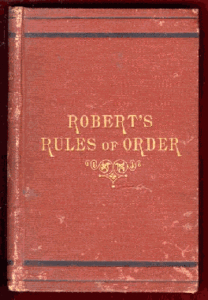
The volunteer team reviewing the decision-making processes we use in Canadian Unitarian Council (CUC) meetings has been quietly working away and would like to share a few updates.
First, we would like to thank everyone who responded to last year’s survey. We have summarized the results of that survey in a simple document here, including a compilation of the various resources on different governance systems or approaches that respondents provided.
Second, we would like to thank the 80 Canadian (and 12 American!) Unitarian Universalists (UUs) who participated in the recent workshop on Uncolonizing Governance. Peter Scales shared wisdom from Capital Unitarian’s 20 years of using the Gradients of Agreement consensus model. Aukje Byker shared early lessons from the Peterborough Fellowship’s work using Sociocracy, a process she has previously used in other organizations. There will be a roundtable conversation on the topic of Uncolonizing Democratic Processes in our congregations on Saturday, February 25; attendance at the prior workshop is not required to participate in this conversation.
Finally, we’d like to invite you with us on a learning journey this spring. We’ll be learning about and trying out different decision-making systems. We’ll also consider what other shifts in process might help us to better engage with each other. Please mark your calendars for Saturday, April 15 and Saturday, June 10: both days will be a two-hour session starting at 10:00 am PT/11:00 am MT/Noon CT/1:00 pm ET/2:00 pm AT and 2:30 pm NT. We will share details in future CUC newsletters and event summaries.
If you can attend this year’s AGM in May (in person or online), we strongly recommend doing so and showing up with extra attentiveness to the process. Ask to serve as a delegate from your congregation or show up as an observer. We’ll be circulating some learning materials around Robert’s Rules of Order and a similar but simpler system, Democratic Rules of Order, in May. If you are on the CUC Leaders mailing list, you will get these automatically. If you are not and would like to sign up for occasional updates from our team, please send a note to decision-making@cuc.ca.
Project Ploughshares: An Interview with Colin Read
An Interview with Colin Read, the Canadian Unitarian Council (CUC) representative on the Governing Committee of Project Ploughshares. Colin is a member of Grand River Unitarian and has been connected with Project Ploughshares for 16 years.
 CUC: In a nutshell, what is Project Ploughshares?
CUC: In a nutshell, what is Project Ploughshares?
CR: Project Ploughshares was formed in 1976 in Waterloo, Ontario under the umbrella of the Canadian Council of Churches. It is now considered one of the premier peace organizations in Canada, and journalist Douglas Roche, in an article in The Hill Times, called executive director Cesar Jaramillo the “new leader” of the peace movement in Canada. Over its 45 plus years of operation, Ploughshares has been working with government agencies, the United Nations, and national and international non-governmental organizations to promote policies that lead to peace.
CUC: Working for peace has so many different facets and approaches. What is the focus of Ploughshares?
CR: There are four main areas that Ploughshares has focused on, which has allowed the staff to become renowned experts in their respective areas. They are nuclear disarmament, global arms trade, outer space security, and emerging technologies that enable autonomous weapons to identify and eliminate enemy targets with or without human oversight.
CUC: Peace-building is often a slow and winding process. What are some of the success stories that have come out of Ploughshares’ work?
CR: The first one that comes to mind, because I had a very small part to play in it, was the passage of the Arms Trade Treaty in 2014. This is an international treaty that regulates the international trade in conventional arms and seeks to prevent and eradicate illicit trade and diversion of conventional arms by establishing international standards governing arms transfers. Ploughshares started work on this treaty over 20 years before it was finally signed into force. Working with other organizations as a member of the International Action Network on Small Arms (IANSA), Ploughshares was a part of the Million Faces Petition back in 2006 that reached its goal of gathering the photos of a million different people in support of an arms trade treaty (my small role involved speaking at a few events and taking people’s photos to be added to the collection). Moving in small steps, it took another eight years to build enough support to get the treaty passed at the United Nations.
Ploughshares was also a part of the International Campaign to Abolish Nuclear Weapons (ICAN) that received the Nobel Peace Prize in 2017, and Project Ploughshares participated actively in the development of the Treaty on the Prohibition of Nuclear Weapons (TPNW), which entered into force in 2021.
Another concrete sign of the respect that Ploughshares has attained was the invitation that Cesar Jaramillo received from Global Affairs Canada to be part of the Canadian delegation to this year’s Nuclear Non-Proliferation Treaty (NPT) Review Conference. In the invitation, they said, “Your perspective—as an esteemed civil society voice in this field—is a valuable one. I am confident that your participation will greatly benefit our delegation’s efforts.” It has not been common practice for Global Affairs Canada to invite representatives from non-governmental organizations to join them!
CUC: Ploughshares operates under the umbrella of the Canadian Council of Churches (CCC), of which the CUC is not a member. Why do we have a voice at Ploughshares, and why is it important?
CR: In the very early years, one of the main people working to get Ploughshares off the ground happened to be a UU, and the space for a CUC representative on the governing committee has been passed along through the years. Having a CUC representative gives us access to cutting edge research and a front row seat on many of the issues and activities that are forging a path towards greater peace, which has and can benefit the social action component of our congregations, and it increases awareness of the CUC and Unitarian Universalism in general.
To learn more about Project Ploughshares, please visit its website.
Continuing the Work of Inclusivity and Our Whole Lives
By Rev. Danielle Webber
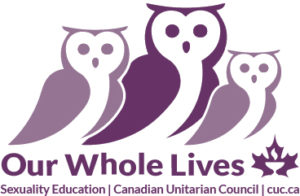 Throughout the fall of 2021, and through all of 2022 Canadian Unitarians/Universalists and Unitarian Universalists worked with the Canadian Unitarian Council’s Social Justice team at expanding our understanding and practices of inclusivity. CUC Social Justice staff Erin Horvath and Amber Bellemare created numerous resources and events that allowed us to practice reflecting on our discomforts and encouraged us to resist common behaviours that arise when we are uncomfortable. And there are Inclusivity Action Groups that are focused on taking action around different barriers towards inclusion.
Throughout the fall of 2021, and through all of 2022 Canadian Unitarians/Universalists and Unitarian Universalists worked with the Canadian Unitarian Council’s Social Justice team at expanding our understanding and practices of inclusivity. CUC Social Justice staff Erin Horvath and Amber Bellemare created numerous resources and events that allowed us to practice reflecting on our discomforts and encouraged us to resist common behaviours that arise when we are uncomfortable. And there are Inclusivity Action Groups that are focused on taking action around different barriers towards inclusion.
Another really excellent opportunity to widen the circle within our congregations comes from the Our Whole Lives (OWL) curricula. OWL is a comprehensive, holistic lifespan sexuality education program, written in collaboration between the Unitarian Universalist Association and the United Church of Christ, that is run within congregation and community settings across the continent and beyond. These curricula expand on the model of sex education many public school graduates would remember, a model of anatomy and abstinence. Each of the developmentally appropriate programs explores concepts of relationships, gender identity and expression, sexual orientation, sexual health and cultural influences on sexuality, and are based on the values of self-worth, sexual health, responsibility, justice, and inclusivity.
Has your congregation recently run an OWL program, or are you considering offering one in the near future? Are you looking at different ways in which your community can expand its outreach into the local city? Are you hoping to encourage members of your congregation or community to take a deeper look at the barriers of inclusion surrounding LGBTQ+, disability, gender, non-traditional families and other areas?
Having facilitators trained to offer OWL programs within your community is one of the ways you can start to dismantle those barriers. The Canadian Unitarian Council is partnering with the First Unitarian Congregation of Ottawa to offer these trainings in May following the symposium! There will be three trainings (children programs, youth programs, and adult programs) held from May 21-23, 2023 in Ottawa. You will be able to find all relevant information for the trainings on the CUC’s website. If you have any questions about the trainings, or about how you might run an OWL program within your community, please contact owl@cuc.ca. There are a few bursary opportunities available for communities which are just beginning their OWL ministries. If this is you please be in touch!
Additionally, there are many resources available for communities that do not have trained OWL facilitators including Taking Flight Webinars, a series of one hour conversations with the OWL Program Managers and guests; a small group ministry program for Parents and Caregivers as Sexuality Educators, and several other book lists and website recommendations. If you would like to discuss how your community can work on inclusivity without the OWL programs please reach out.
Covenanting Through Transitions

Over 200 Unitarian Universalists gathered on Sunday, February 5 to participate in the most recent national worship service, which explored hard questions like: “How do we stay in covenant in our communities? How do we stay engaged in a good way when it is hard and when people aren’t their best selves or are disappointed?”
The service featured moving reflections from Rev. Linda Thomson (Canadian Unitarian Council), Arran Morton (Comox Valley Unitarian Fellowship), and Rev. Lara Cowtan (Vancouver Unitarians), a guided ritual led by religious educator Kiersten Moore (Vancouver Unitarians), and music performed by Dick Jackson and Cathy Baker (Capital Unitarian Universalist Congregation).
You can watch the service at your convenience on our YouTube channel.
Apply for the Sharing our Faith and Theological Education Funds
By Kenzie Love
 The application deadline for two of the Canadian Unitarian Council’s subsidy funds is approaching. Applications are due March 31 for the Sharing Our Faith fund, and Theological Education Funds.
The application deadline for two of the Canadian Unitarian Council’s subsidy funds is approaching. Applications are due March 31 for the Sharing Our Faith fund, and Theological Education Funds.
The Sharing Our Faith program provides funds for congregational initiatives. These can be to support ministry, aid congregational projects and outreach, and enhance the Unitarian Universalist movement in Canada. The fund consists of monies donated to the Sharing Our Faith fund, which are supplemented by a Foundation Fund administered by the First Unitarian Congregation of Toronto. The CUC distributes the funds as grants to congregations for growth projects and initiatives.
The Theological Education Fund bursaries support Unitarian and Universalist (UU) theological education in Canada by supporting:
-
- UUs in Canada with expenses incurred annually by studying for the Ministry;
- Canadian UU ministers with continuing education expenses; and
- Canadian UU congregations who wish to support an intern minister.
Bursaries are awarded based on financial need. An individual may receive a bursary up to three times in each category (three times for a student and three times for a minister).
2023 Intergenerational Spring Seminar
By Kenzie Love
 The 2023 Intergenerational Spring Seminar, Demilitarization & Abolition: Resist Policing and Empire, will be hosted by the Unitarian Universalist Association Office at the United Nations in close partnership with the Unitarian Universalist College of Social Justice and the UU Service Committee. All in-person and youth registration closes March 15; adult online registration closes March 30.
The 2023 Intergenerational Spring Seminar, Demilitarization & Abolition: Resist Policing and Empire, will be hosted by the Unitarian Universalist Association Office at the United Nations in close partnership with the Unitarian Universalist College of Social Justice and the UU Service Committee. All in-person and youth registration closes March 15; adult online registration closes March 30.
The seminar will take place in-person in Minneapolis and online, April 1 – 3, 2023. The event aims to instill in Unitarian Universalist youth and adults a commitment to global engagement and the skills to take action locally to address global issues.
The intergenerational seminar is an opportunity to collaborate with others while learning how to be a global activist. Through workshops, peer and expert-led panel discussions, community building activities, and worship services, you will undergo a transformative process of learning, reflection, and growth while exploring some of the most challenging issues facing humanity today.
Empowerment with the Goddesses: Celebrating International Women’s Day
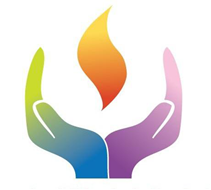 The Canadian Unitarian Universalist Women’s Association (CUUWA) invites all Unitarian Universalists and congregations across Canada to celebrate International Women’s Day on March 6 or March 13, 2023. (March 8 is International Women’s Day.)
The Canadian Unitarian Universalist Women’s Association (CUUWA) invites all Unitarian Universalists and congregations across Canada to celebrate International Women’s Day on March 6 or March 13, 2023. (March 8 is International Women’s Day.)
CUUWA has developed resources for you to use in your International Women’s Day service. The 2023 theme is “empowerment with the goddesses.” You can find the resource package on the CUUWA website.
Unicamp Dog Survey
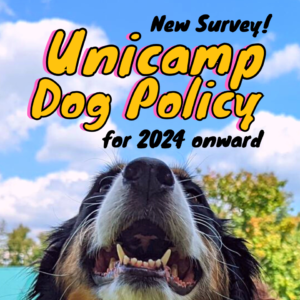 Unicamp is revisiting its dog policy, and they would love to hear your thoughts! Please fill out the following survey and share it with any current and potential future Unicampers you know! The survey closes on March 1st, 2023, and should take less than 10 minutes of your time. It could have a real impact on Unicamp’s policy.
Unicamp is revisiting its dog policy, and they would love to hear your thoughts! Please fill out the following survey and share it with any current and potential future Unicampers you know! The survey closes on March 1st, 2023, and should take less than 10 minutes of your time. It could have a real impact on Unicamp’s policy.
The Board of Unicamp is hoping to gather information from the wider Unicamp community to make an informed decision about the amount of time dogs should be allowed at Unicamp.
The CUC is Hiring!

The Canadian Unitarian Council is hiring a Congregational Life Lead for the British Columbia and Western regions to fill the position left by Joan Carolyn’s resignation. The position will remain open until it is filled; we hope to have the successful candidate join the rest of the CUC staff team in-person in Ottawa, Ontario for the National Symposium in May.
The position is full-time and is accompanied by a robust benefits package.
Applicants who are selected for interviews will be contacted.
Please check out the details on the CUC’s Jobs and Volunteering page.
Call for Nominations: CUC Board of Trustees and Nominating Committee
![]() Do you want to join the Canadian Unitarian Council (CUC) Board of Trustees? We are looking for two new members to act as representatives for the eastern and western regions. We are also looking for one person from British Columbia or the western region to join the Nominating Committee, and for one of the new or existing trustees to serve as CUC treasurer following the Annual General Meeting on May 19, 2023.
Do you want to join the Canadian Unitarian Council (CUC) Board of Trustees? We are looking for two new members to act as representatives for the eastern and western regions. We are also looking for one person from British Columbia or the western region to join the Nominating Committee, and for one of the new or existing trustees to serve as CUC treasurer following the Annual General Meeting on May 19, 2023.
The call for nominations has been extended to Thursday, March 9, 2023. If you are interested, want more information, or would like to suggest someone as a candidate, please send an email to nominations@cuc.ca. A member of the Nominating Committee will respond to you.
For more information, please read the Call for Nominations.
What’s Making Us Smile
In honour of “Love Your Pet Day” on February 20, check out these bus-riding dogs who’ve stolen the hearts of millions of fans.
Calendar of Events (February 22 – July 16, 2023)
Share what’s going on in your congregation. Contact communications@cuc.ca
Leaders’ Roundtable: Uncolonizing Democratic Processes
February 25: 9:00 a.m. PT | 10:00 a.m. MT | 11 :00 a.m. CT | 12:00 p.m. ET | 1:00 p.m. AT | 1:30pm NT (1.5 hours)
Designing & Leading Rites of Passage: Basics Training for Lay Chaplains
February 25: 9:00 am PT | 10:00 am MT | 11:00 am CT | 12 noon ET | 1:00 pm AT | 1:30 pm NT (6 hours)
February 26: 11:30 am PT | 12:30 pm MT | 1:30 pm CT | 2:30 pm ET | 3:30 pm AT | 4:00 pm NT (3.5 hours)
March 4: 9:00 am PT | 10:00 am MT | 11:00 am CT | 12 noon ET | 1:00pm AT | 1:30pm NT (6 hours)
Lay Chaplains Chat (online)
March 6: 4:30 pm PT | 5:30 pm MT | 6:30 pm CT | 7:30 pm ET | 8:30 pm AT | 9:30 pm NT (90 minutes)
Gathered Here: A Monthly Check-in for UU Young Adults (18-35)
March 13: 5:00 pm PT | 6:00 pm MT | 7:00 pm CT | 8:00 pm ET | 9:00 pm AT | 9:30 pm NT
UUConnecting
March 19: 4:00 pm PT | 5:00 pm MT | 6:00 pm CT | 7:00 pm ET | 8:00 pm AT | 8:30 pm NT (1.5 hours)
Rising Together: UU Youth and Emerging Adults of Colour
April 1: 1:00 pm PT | 2:00 pm MT | 3:00 pm CT | 4:00 pm ET | 5:00 pm AT | 5:30 pm NT (1.5 hours)
Inclusivity Action Groups: Moving Through Hurt
April 5: 4:00 pm PT | 5:00 pm MT | 6:00 pm CT | 7:00 pm ET | 8:00 pm AT | 8:30 pm NT (2 hours)
Gathered Here: A Monthly Check-in for UU Young Adults (18-35)
April 13: 11:00 am PT | 12:00 pm MT | 1:00 pm CT | 2:00 pm ET | 3:00 pm AT | 3:30 pm NT (1.5 hours)
UUConnecting
April 16: 4:00 pm PT | 5:00 pm MT | 6:00 pm CT | 7:00 pm ET | 8:00 pm AT | 8:30 pm NT (1.5 hours)
AGM Plenary on Motions: Leaders’ Roundtable
April 29: 9:00 a.m. PT | 10:00 a.m. MT | 11:00 a.m. CT | 12:00 p.m. ET | 1:00 p.m. AT | 1:30pm NT (1.5 hours)
Rising Together: UU Youth and Emerging Adults of Colour
May 6: 1:00 pm PT | 2:00 pm MT | 3:00 pm CT | 4:00 pm ET | 5:00 pm AT| 5:30 pm NT (1.5 hours)
CUC Annual General Meeting
May 19: 10:00 am PT | 11:00 am MT | 12:00 CT | 1:00 pm ET | 2:00 pm AT | 2:30 pm AT (3.5hrs)
CUC National Symposium 2023: Living into the 8th Principle
May 19-21
National Worship Service
May 21: 7:30 am PT | 8:30 am MT | 9:30 am CT | 10:30 am ET | 11:30 am AT (1.5 hours)
UUConnecting
May 21: 4:00 pm PT | 5:00 pm MT | 6:00 pm CT | 7:00 pm ET | 8:00 pm AT | 8:30 pm NT (1.5 hours)
Rising Together: UU Youth and Emerging Adults of Colour
June 3: 1:00 pm PT | 2:00 pm MT | 3:00 pm CT | 4:00 pm ET | 5:00 pm AT | 5:30 pm NT (1.5 hours)
Lay Chaplains Chat (online)
June 5: 4:30 pm PT | 5:30 pm MT | 6:30 pm CT | 7:30 pm ET | 8:30 pm AT | 9:30 pm NT (90 minutes)
Inclusivity Action Groups: Managing Resistance
June 7: 4:00 pm PT | 5:00 pm MT | 6:00 pm CT | 7:00 pm ET | 8:00 pm AT | 8:30 pm NT (2 hours)
Gathered Here: A Monthly Check-in for UU Young Adults (18-35)
June 12: 5:00 pm PT | 6:00 pm MT | 7:00 pm CT | 8:00 pm ET | 9:00 pm AT | 9:30 pm NT
UUConnecting
June 18: 4:00 pm PT | 5:00 pm MT | 6:00 pm CT | 7:00 pm ET | 8:00 pm AT | 8:30 pm NT (1.5 hours)
Rising Together: UU Youth and Emerging Adults of Colour
July 1: 1:00 pm PT | 2:00 pm MT | 3:00 pm CT | 4:00 pm ET | 5:00 pm AT | 5:30 pm NT (1.5 hours)
UUConnecting
July 16: 4:00 pm PT | 5:00 pm MT | 6:00 pm CT | 7:00 pm ET | 8:00 pm AT | 8:30 pm NT (2 hours)

